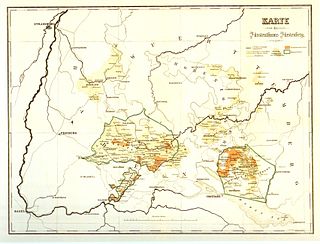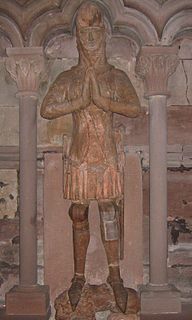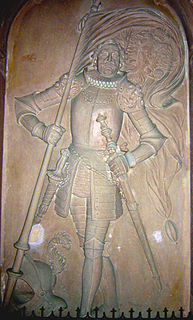Egino or Egeno may refer to:

The House of Zähringen was a dynasty of Swabian nobility. The family's name derived from Zähringen Castle near Freiburg im Breisgau. The Zähringer in the 12th century used the title of Duke of Zähringen, in compensation for having conceded the title of Duke of Swabia to the Staufer in 1098. The Zähringer were granted the special title of Rector of Burgundy in 1127, and they continued to use both titles until the extinction of the ducal line in 1218.

Freiburg im Breisgau, commonly referred to as Freiburg, is an independent city in Baden-Württemberg, Germany. With a population of about 230,000, Freiburg is the fourth-largest city in Baden-Württemberg after Stuttgart, Mannheim, and Karlsruhe. The population of the Freiburg metropolitan area was 656,753 in 2018. In the south-west of the country, it straddles the Dreisam river, at the foot of the Schlossberg.

Fürstenberg was a county, and later a principality (Fürstentum), of the Holy Roman Empire in Swabia, which was located in present-day southern Baden-Württemberg, Germany. Its ruling family was the House of Fürstenberg.

The House of Fürstenberg is the name of an old and influential a Swabian noble house in Germany, based primarily in what is today southern Baden-Württemberg near the source of the Danube river.
Conrad of Urach was a Cistercian monk and abbot, and Cardinal Bishop of Porto and Santa Rufina; he declined the papacy.

Conrad of Lichtenberg was a bishop of Strasbourg in the 13th century.

The Schlossberg is a tree-covered hill of 456 metres (1,496 ft) located in the area of the city of Freiburg im Breisgau. It is directly to the east of Freiburg’s Old Town and belongs to the Black Forest. The main geological fault is at the western edge of the Schlossberg, towards the Upper Rhine Graben.

Achalm is a mountain in Reutlingen, Germany. On its top, the ruins of Achalm Castle can be found, ancestral seat of the counts of Achalm, a 13th-century Swabian noble family related to the counts of Urach.

The Counts of Freiburg were the descendants of Count Egino of Urach. They ruled over the city of Freiburg and the Breisgau between approximately 1245 and 1368.
Egeno I of Konradsburg was one of the free knights (Edelfrei) of Konradsburg, in the northeast of the Harz region of Germany, near Ermsleben.
Egeno II of Konradsburg was a free knight of Konradsburg, in the northeast of the Harz region in Central Germany, near Ermsleben.

Frederick I, Count of Zollern, was often cited as a powerful Swabian Count and supporter of the imperial party of Henry V, Holy Roman Emperor.

Berthold IV, Duke of Zähringen was a Duke of Zähringen and Rector of Burgundy. He was the son of Conrad I, Duke of Zähringen and Clementia of Luxembourg-Namur. He founded numerous cities, including Fribourg.

Henry II, Margrave of Baden-Hachberg was the ruling Margrave of Baden-Hachberg from 1231 to 1289.

Adalbert I, Duke of Teck was a German nobleman. After the death of his brother Berthold IV, he styled himself Duke of Teck, and thus founded the elder line of the Dukes of Teck, which existed until 1439.

Freiburg Castle is a vanished castle. When it existed it was usually called the Burghaldenschloss.

Mechthild of the Palatinate (1418–1482) was a princess and major patroness of the literary arts in the 15th century.

The House of Urach is a morganatic cadet branch of the formerly royal House of Württemberg. Although the Württemberg dynasty was one of many reigning over small realms in Germany into the 20th century, and despite the fact that marital mésalliances in these dynasties usually disinherited the descendants thereof, the Dukes of Urach unusually managed to elicit consideration for candidacy for the thrones of several European states, viz. the Kingdom of Württemberg, the abortive Kingdom of Lithuania, the Principality of Monaco and even the Principality of Albania. Although none of these prospects came to fruition, they reflected monarchical attempts to accommodate the rapid shifts in national allegiance, regime and international alliances that intensified throughout the 19th century, leading up to and following Europe's Great War of 1914–1918.

Henry I, German: Heinrich I from the House of Zähringen was margrave of Baden-Hachberg. He was the founder of the Baden-Hachenberg branch.

Egino IV, also written as Egeno or Egon, and called the Bearded, was Count of Urach from 1181 to 1230 and co-ruler of the County of Frieburg with his son Egino V from 1218 to 1230.